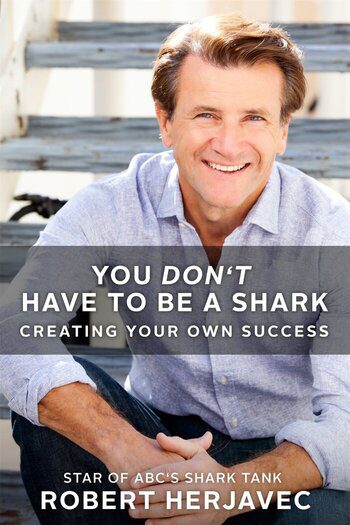“The World Owes You Nothing—Except Opportunity”
Print | Kindle(eBook) | Audiobook
Shark Tank is my favorite Business Reality TV Show and Robert Herjavec is my favorite shark. I have been a fan of the show since 2011 and I find the show to be both entertaining and educational. In You Don’t Have to Be a Shark, Robert transcends pure sales techniques and teaches “non-business people” what they need to know in order to sell themselves successfully. The book’s theme:
Great salespeople are made, not born, and no one achieves success in life without knowing how to sell.
No matter what you want to achieve or who you want to become, the ability to sell anything—including yourself—is one of the most rewarding talents to acquire in life. Why? Because it is universal. It is difficult to imagine any aspect of life that would not benefit from knowing and practicing the skills of making a sale.
Here are my favourite takeaways from reading, You Don’t Have to Be a Shark by Robert Herjavec:
“Professional selling is a matter of finding ways to meet the needs and expectations of both sides.“
- Selling is not only about making a sale to a customer or a client. At heart, it’s also about persuading someone to see your side of things and reach an outcome that ideally benefits both of you. Some people misunderstand this concept. They think it’s all about coercion and manipulation, when it really involves getting people first to see your side of things, then take the appropriate action.
“Eventually everyone is selling something to someone.”
- It happens at every stage of a business: lawyers file agreements to launch the new company; brokers convince investors to provide start-up funds; entrepreneurs attract the talent needed to run the firm; designers and programmers make presentations to management for approval to proceed—every one of those steps demands selling skills.
While growing up, a salesman deceptively sold a vacuum cleaner to Robert’s mom, and that experience left an indelible impression on him and his outlook on selling:
“The memory of my father’s anger, my mother’s humiliation, and the salesman’s greed will stay with me forever. But it didn’t deter me from understanding the importance of making sales if a business is to succeed. Instead, it inspired me to achieve success in selling not by exploiting the vulnerability of customers but by appealing to their intelligence. I would do this by tailoring my sales message to their situation, their needs, their wants, and their values.”
The Perfect Sale:
- The customer believes he or she has been in control of the situation and has completed a transaction that benefits both buyer and seller. And, when all goes well, they are entirely correct.
Cold Call
The best solution is to follow a script, or at least a fixed procedure. Either way, every cold call needs to achieve these in rapid order:”
1. Raise the prospect’s curiosity. (“Who is this? Why should I care?”)
2. Provide context in a dozen words or less, also known as an elevator pitch (“We’ve cut energy costs for people in your industry by 35 percent.”)
3. Ask for permission to continue. (“May I explain how it’s done? It will take less than a minute.”)
4. Confirm that the prospect is a fit. (“Does this sound like the kind of advantage you’d like to have over competition?”)
5. Schedule a full presentation—date, time, and attendees. (“May I send you some material to explain the process before our meeting?”)
Getting to step 5 is more art than science. Cold callers need a script and guidelines, but they also need to anticipate objections and concerns and know how to handle them gracefully (“Did I call you at a bad time?” “May I send you the material and call you when you’ve had a chance to study it?”).
Life is a Marathon
“I have run marathons, and I can assure you that the people at the front of the pack when the starter’s gun goes off are not in the same position 26.2 miles down the road, when the finish line is crossed. Life is a marathon. We all begin from a different position, and our positions change throughout the race. The best we can accept is that we have the chance to move up while the race is being run.”
Enthusiasm
- When it comes to the art of selling, however, the biggest factor in determining someone’s success isn’t “natural ability.” It’s training and enthusiasm. If you have enough desire and energy and follow the guidance of an effective mentor, you will amaze yourself (and the rest of the world) with your accomplishments. This works even if you have zero experience in selling.
Four of the most important traits for good Salespeople
1. They believe in what they do.
Great salespeople have a hard time selling anything they don’t believe in. They have an equally large problem if they also don’t believe in the importance of their job.
2. They enjoy the company of people.
Selling is not entirely an individual sport. Long-term success depends on a salesperson’s ability to work well with support staff who take charge of things such as delivery, service, financing, and a dozen other tasks.
3. They spend more time listening than talking
Successful selling isn’t about drowning a customer in facts and figures. It’s about asking questions and listening carefully, not just to what is being said but also how it is being said and what is not being said. Tone and delivery can reveal much about whatever the speaker is trying to express in words. And body language can communicate a world of meaning without a word being spoken, or in spite of a word that may have an entirely different meaning from whatever the speaker intended.
4. They make the connection between selling skills and life.
Whether choosing a life partner, raising our children, seeking a job, running for political office, or performing a hundred other actions, we must persuade others to see our point of view, follow our lead, and value our abilities.
“Risks are an inevitable part of life. Success lies in taking measured risks, and avoiding the big risks that can destroy your dreams of success.”
Fear
- We fear change because change involves the future, where the roots of all fears are found. Nothing in the past can hurt us, but the future may be painful. If you bear the scars of failure and frustration in your career or personal life, you may fear that more of the same lies somewhere in your future as well.
- That’s understandable. But the difference between a painful past and an unknowable future is right in front of you. It is today, the here and the now. This can be your pivot point, the place where you take charge of your life to both put the past behind you and shape the future ahead of you, keeping it free of everything but satisfaction and achievement.
“Courage is not the absence of fear; it is the power to do things in the presence of fear, and do them well.”
“I wish I had…” syndrome
- You will also need to ignore the “I wish I had…” syndrome that keeps reminding you of the chances you have lost and the time you have wasted. Making a career change often involves rejecting much of your working life to that point.
- Don’t waste time regretting the fact that you didn’t make the move earlier, and refuse to beat yourself up about it. Along the way, you gained knowledge and experience. Now is the time to use them.”
Ten Things You Need to Do When Making a Change in Your Life
1. Be disciplined—develop and maintain a work ethic.
2. Be focused—concentrate on the task at hand; the greater the challenge, the sharper the focus.
3. Be competitive—welcome competition and accept that life rarely offers something of value that someone else will not try to get for themselves.
4. Be resourceful—use every asset available to you.
5. Be passionate—the more you believe in your product and yourself, the more successful you’ll become.
6. Be critically minded—assume the attitude that lets you “think outside the box” when needed.
7. Be persistent—prepare yourself to hear no, but never let it discourage you.
8. Be curious—look for new ways to learn about customers, their concerns, their business, and their personalities.
9. Be confident—without being arrogant.
10. Be happy—try to be the source of joy for others; more than almost any other personal quality, this will attract others to you.
Greater Equalizer
- Time is the great equalizer in life. Everyone is given the same amount of time every day. It is up to us to use those hours according to our needs and wants. When we use it well, we profit in various ways. When we waste it, it is gone forever; time is not a replenishable resource.
All the best in your quest to get better. Don’t Settle: Live with Passion.
Print | Kindle(eBook) | Audiobook



Comments are closed.